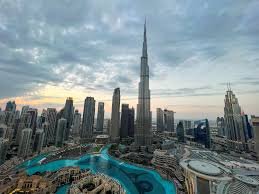The United Arab Emirates (UAE) has long been known for its oil wealth, but recent years have shown a different trend. The country’s non-oil business sector has been growing steadily, proving that the economy is diversifying successfully. From tourism to technology, industries outside of oil are expanding rapidly, creating new jobs and attracting investments. This article explores what’s driving this growth, the key industries benefiting, and what it means for the future of the UAE’s economy.
Why Is the UAE’s Non-Oil Sector Growing?
Several factors are contributing to the strong growth of the UAE’s non-oil business sector. One of the biggest reasons is the government’s push for economic diversification. The UAE’s Vision 2030 plan aims to reduce reliance on oil and boost industries like tourism, real estate, logistics, and finance.

Additionally, the country has introduced several policies that make it easier for businesses to start and grow. These include:

- 100% Foreign Ownership: Businesses in many sectors can now be fully owned by foreigners, attracting more international investments.
- Golden Visa Program: This program allows talented professionals, investors, and entrepreneurs to live and work in the UAE long-term.
- Business-Friendly Environment: Low taxes, advanced infrastructure, and strategic location make the UAE a great place to do business.
Key Sectors Driving Non-Oil Growth
Several industries have played a crucial role in the UAE’s non-oil sector growth. Here’s a look at some of the top-performing ones:
1. Tourism and Hospitality
Tourism remains one of the UAE’s strongest sectors, with cities like Dubai and Abu Dhabi attracting millions of visitors each year. Mega-events like Expo 2020 and the upcoming COP28 climate conference have helped boost tourism. The country’s luxury hotels, shopping malls, and cultural attractions keep drawing international tourists.
2. Technology and Innovation
The UAE is investing heavily in technology, artificial intelligence, and digital transformation. The government has launched smart city initiatives, promoted fintech startups, and encouraged blockchain adoption. The Dubai Internet City and Abu Dhabi’s Hub71 are hubs for tech businesses looking to expand in the region.
3. Real Estate and Infrastructure
The UAE’s real estate market is booming, with new developments attracting investors from around the world. The demand for luxury properties in Dubai, Abu Dhabi, and Sharjah remains high. Major projects like the Dubai Creek Harbour and Masdar City are examples of how the country is pushing for sustainable urban development.
4. Manufacturing and Industry
The UAE has been expanding its manufacturing sector to become a regional hub for production. The focus is on industries like aerospace, automotive, and food production. Government initiatives like “Operation 300bn” aim to boost local manufacturing and reduce reliance on imports.
5. Logistics and Trade
With world-class ports like Jebel Ali and Khalifa Port, the UAE has positioned itself as a global logistics hub. Its strategic location between Europe, Asia, and Africa makes it a key player in international trade. The growth of e-commerce has also increased demand for logistics and warehousing services.
What Does This Growth Mean for Businesses and Workers?
The steady growth of the UAE’s non-oil business sector is great news for businesses, investors, and job seekers. More international companies are setting up offices in the UAE, creating more employment opportunities. Industries like tech, tourism, and finance are in high demand, attracting skilled professionals from around the world.
For entrepreneurs, the UAE offers a thriving startup ecosystem with access to funding, mentorship, and global markets. The government’s support for small and medium enterprises (SMEs) has made it easier for startups to grow and succeed.
Challenges and Future Outlook
Despite the impressive growth, there are challenges that the UAE must address. Competition from other regional markets, the need for more skilled talent, and global economic uncertainties could impact growth. However, with continuous investment in innovation, sustainability, and infrastructure, the UAE is well-positioned to keep expanding its non-oil economy.
Looking ahead, the UAE’s commitment to economic diversification will likely lead to even more opportunities. With major projects, business-friendly policies, and a focus on sustainability, the country is set to strengthen its position as a global business hub.
Final Thoughts
The UAE’s non-oil business sector is thriving, thanks to strong government initiatives, a favorable business environment, and investment in key industries. As the country moves towards a more diversified economy, opportunities for businesses and professionals will continue to grow. Whether you’re an investor, entrepreneur, or job seeker, the UAE’s economic transformation presents exciting possibilities for the future.
Also read: Revolutionizing the Future: 20 Game-Changing 3D Printing Breakthroughs in the UAE













